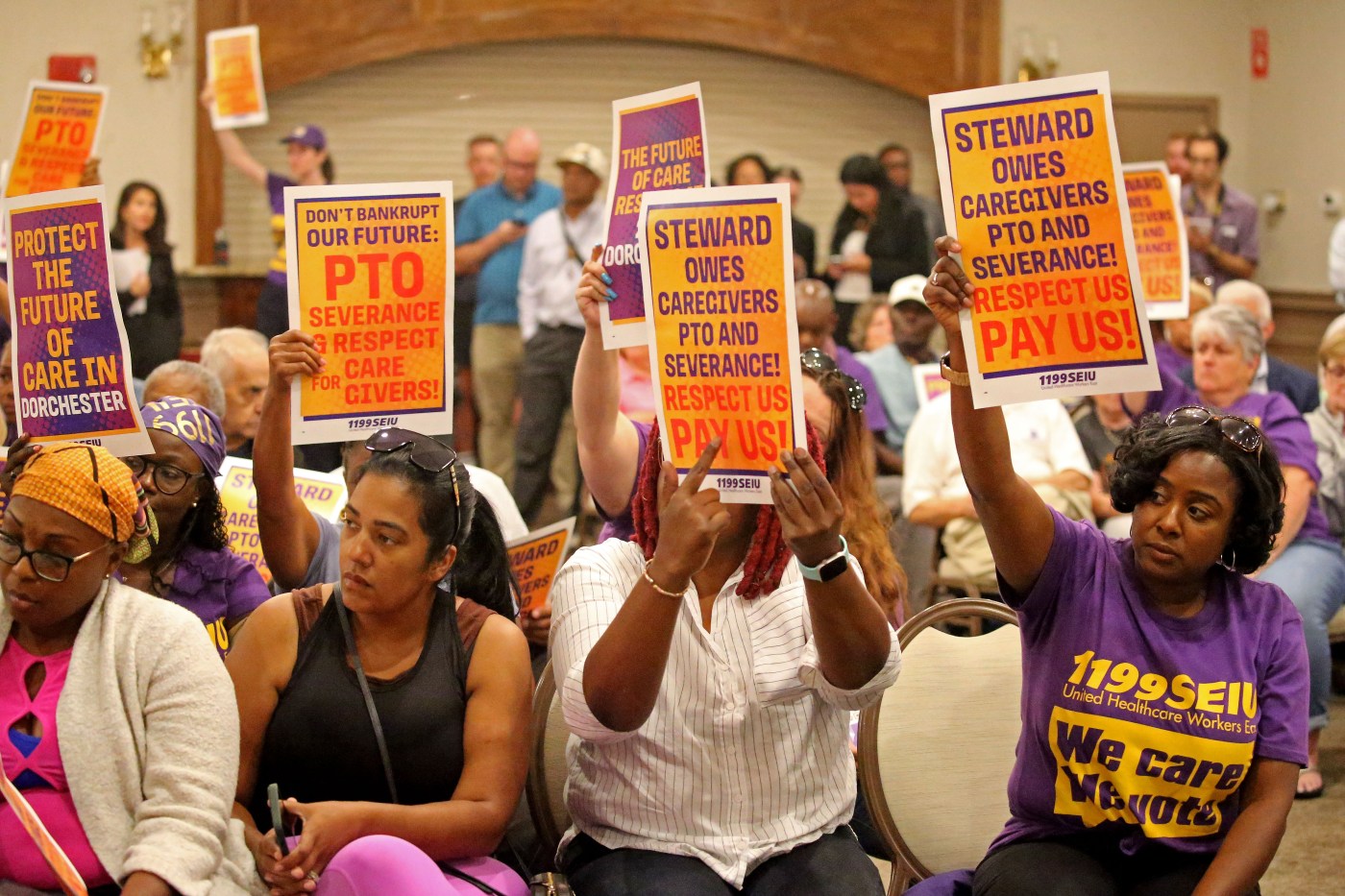
Tempers boil as Carney founders: State, city will not act to save hospitals from going under
If residents of Dorchester thought they were going to hear some good news regarding the fate of their community hospital during a Department of Public Health hearing, officials were quick to dash those hopes when they said there is nothing they can do to stop what is happening.
The state cannot and will not get in the way to stop the closure of Steward Health Care’s Carney Hospital, DPH commissioner Dr. Robbie Goldstein told a crowd hundreds-strong at Florian Hall on Tuesday.
“The Department of Public Health does not have the ability, nor the authority, to prevent or deny closure of the hospital. We cannot force a hospital to stay open, especially if doing so might risk the quality of care that’s delivered or the safety of the patients,” Goldstein said.
The city of Boston, even if it could just declare a public health emergency, can’t afford to run the hospital and won’t be going down that route, said Boston Public Health Commissioner Dr. Bisola Ojikutu.
“As the city’s local health department, we cannot stop the closure of Carney Hospital and I’m sad to say that,” she said.
“Some have suggested we declare a public health emergency. Declaring a public health emergency will not give the city, Mayor Wu, or I, the regulatory authority, the licensure ability, and most importantly the money that it will take to run Carney Hospital even in the short term. So we will not be declaring a public health emergency,” Ojikutu said.
That didn’t go over well with the audience.
“Bullsh*t,” a woman in the crowd said as Goldstein stepped away, before apologizing for being from Dorchester.
“Horsesh*t,” she said moments later as Ojikutu was speaking.
Boston City Councilor Ed Flynn seemed to agree.
When Flynn, who worked at Carney as a security guard once upon a time, took to the microphone, he directed his comments right to the DPH staff holding the hearing and the two public health officials saying there is nothing they can do to prevent Dorchester from becoming a health desert.
“I don’t accept the premise that the city of Boston or the Commonwealth of Massachusetts can’t keep this hospital open,” he said. “We have the ability to keep it open, if we have the moral courage to keep it open. This about public safety, this is a public health issue, this is an emergency. My friends, it’s also a civil rights issue.”
Steward Health Care, which owns Carney and seven other Massachusetts hospitals, filed for Chapter 11 bankruptcy in May, citing $9 billion in debt obligations. The company said they would have to sell their hospital properties to meet those obligations, but that they would aim to keep the facilities in operation through the sale process.
An auction held in July saw most of the hospitals receive bids for sale, but not Carney or Nashoba Valley Medical Center, in Ayer. Steward announced later that it would close the pair of hospitals.
Dr. Octavio Diaz, Steward’s northeast region president, said closing Carney is the only path forward for the company if it wants to ensure patient health.
“I share this community’s love for this hospital,” he said. “Closing a hospital is painful, and there is nothing that I can say today that will make that any easier. While closing Carney Hospital is deeply regrettable, it is also unavoidable.”
“Carney hospital will close its doors on August 31st, 2024, as directed by the United States bankruptcy court,” Diaz said.
The focus now, he said, should be on moving patients to new facilities.
Boston City Councilor John Fitzgerald rejected that line of thinking.
“I don’t know what stage I’m in anymore, right? Anger, denial – whatever comes after that – but I know what stage I will not get to, and that’s acceptance. It is impossible to accept that there is nothing to do and our hands are tied. It’s impossible for me to accept that the Carney is going to close and there is nothing we can do to help the nurses, the patients, and the small business that it supports. I can’t get there on a personal level,” he said.
Closing Carney, radiology nurse Maryanne Murphy said, would permanently change the face of Dorchester.
“I have been with Carney over 40 years. This hospital is so vital for this community. It was like that for my parents who worked there, for my brothers and sisters, aunts, uncles, and all cousins, who all worked there and were very dedicated to our jobs. We here at Carney are a big family. You are not just a patient – you are our friend and our neighbor,” she said.
“What will you do when this place closes? Where will you get your healthcare,” she asked.
Texas-based federal bankruptcy Judge Christopher Lopez has approved the closure of Carney and Nashoba Valley, citing Stewards business interests as they move through bankruptcy proceedings.
Steward also owns Good Samaritan Medical Center in Brockton, Holy Family Hospitals in Haverhill and Methuen, Morton Hospital in Taunton, Saint Anne’s Hospital in Fall River, and St. Elizabeth’s Medical Center in Brighton. The company’s Norwood Hospital has been closed since 2020 due to flooding, and the company closed New England Sinai Hospital permanently in April.
DPH commissioner Robbie Goldstein, MD, PhD, speaks at Tuesday’s hearing. (Staff Photo By Stuart Cahill/Boston Herald)
Union members protest the looming closure of Dorchester’s Carney Hospital outside a DPH hearing last night. (Staff Photo By Stuart Cahill/Boston Herald)


